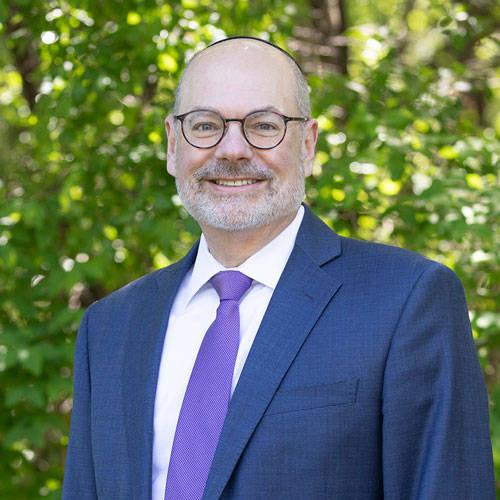Forward
Forward
 by Rabbi Sidney M. Helbraun
by Rabbi Sidney M. Helbraun
In 2008, I received a call from Beth-El member Bruce Levin, asking if the congregation was interested in receiving a Sephardic Torah.
“Of course,” I said, “But why? Do you have one lying around the house?” “Sort of,” he said. So I asked him to explain.
Bruce told me a story about the town he grew up in, New Britain, Connecticut. He told me about a night, back in the 1940’s, when his father, Abe, was preparing to open up a men’s and boys’ clothing store. Abe was putting the finishing touches on the store’s window display when a well-dressed man, who had already had a couple of drinks, stumbled up to the window, and in a determined voice shouted: “Hey, I want to be your first customer.”
That man was Yale Sable, and he and Abe quickly became best of friends. Unfortunately, Yale died at a relatively young age. Abe wanted to find a fitting way to remember his friend, so he commissioned a Jerusalem scribe to craft a Sephardic Torah, with a beautiful sterling silver cover, decked in jewels, to be given to their congregation, Temple B’nai Israel, in memory of his beloved friend.
I thanked Bruce for sharing the story, but I was still confused. “How did this Torah end up in your hands?” I asked. He told me that B’nai Israel was closing, as there weren’t enough Jews left in New Britain to sustain the temple. And since Bruce’s father had donated the Torah, they thought he might want to find it a new home. That’s why he called me.
Several months later, Bruce brought the Torah from New Britain to Northbrook. On that Shabbat, we held a dedication service. I was very pleased that a dozen or so past members of B’nai Israel were able to join us for the service.
As we dedicated the Torah, I mentioned that it was a night of mixed emotions. In the history of our people, synagogues often closed because their worshipers had been driven away or killed. But this was not the case here. Temple B’nai Israel’s closing had nothing to do with persecution. Rather, the Jewish community had simply moved on. They had left the town and found new places to live, new congregations to belong to. That night we gathered, not to mourn a tragic destruction, but rather to mark a moment of transition.
So why am I am sharing this story? Because, viewed in this light, the history of Temple Beth-El is not only unique—it is inspiring. Beth-El may not reside in a 140-year-old building. It may not possess dozens of historic objects. But what Beth-El does have—what makes our story so important—is the continuity of its community. Our treasure is found in the people who founded, nurtured, and ministered to this congregation.
It would have been no crime for Beth-El to follow the path of so many other congregations. It would have been no sin if, when its members migrated to new communities, Beth-El closed its doors. And yet, time after time, Beth-El’s leaders and people chose to bring their congregation with them. More than the story of a building, Beth-El is a story of community and vision.
Today, Beth-El members live in downtown Chicago in the south to Vernon Hills in the north. They live in Palatine in the west to Highland Park in the east. They come from Northbrook, Deerfield, Glenview and all points in between. What brings us together is the same thing that united earlier generations. It is a bond we share with each other, and a sense of obligation—that Judaism—as it is practiced and preached in the walls of this congregation—has something to teach to us, and the world.
What keeps Beth-El’s doors open today? What is our vision of the future? It begins with the realization that we are more than solitary individuals who come and go from the world, that we are part of a great people with a mission to maintain God’s presence in the world. We do this by building and supporting our homeland, the state of Israel, and by embodying the virtues and values, the mitzvot of Judaism through our lives, thus bearing witness to God’s presence in the world.
We live in an age of change and opportunity. Beth-El embraces this age, opening our doors to every Jew and reaching out to those who were not born of our faith, but who through fate or circumstance have a desire to connect with the Jewish people. Our timeless wisdom has much to teach in our modern world, and we welcome all who wish to live righteously, build family, and become partners with God in creating a better world.
Tue, October 14 2025
22 Tishrei 5786
In This Section
Quick Links
Email Us
Privacy Settings | Privacy Policy | Member Terms
©2025 All rights reserved. Find out more about ShulCloud



